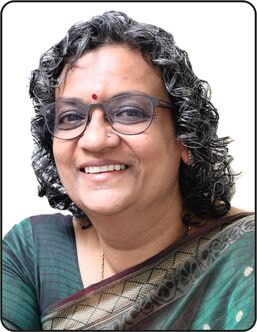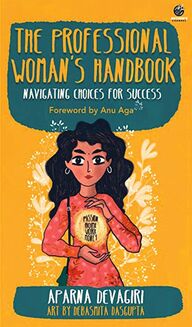|
Aparna is a professional with 30+ years experience in corporates and as an entrepreneur. She started her career in Bharat Electronics, then moved on to SKF Bearings, Encore Software, Strides and 3M India. She now runs her own consultancy, focused on supporting women professionals. Aparna is an author, leadership / executive coach, leads workshops and conducts research and projects to support women entrepreneurs. Aparna can be reached at [email protected]. 1. What’s your story? Growing up I had the opportunity to live in different cities and countries, and because of that I experienced many different cultures. I was born in Delhi, grew up in Madras (then), Germany, Bangalore, once again in Delhi and then once again in Bangalore. As a child, I thought that moving from one place to another was difficult and not so pleasant. I would make and lose friends, and have to build new relationships in every place we went to. But when I look back now, I realise the positive influence this exposure has had on my thinking and approach to life. After completing my degree (BA Hons in Geography from Miranda House), I came back to Bangalore and did my MSW here. After that, I started working. For me, there was never a question about whether I would work, more about what I would do. One thing I am proud of, is that I have been able to give the right focus to my career and to my family through the years. After 26 years in the corporate world I started working on my own. Now I am an author, a leadership coach, and I run a podcast and work with women entrepreneurs to help them become successful. My belief is that if India has to grow as an economy at the rate the government is planning, it will not be possible if we do not actively involve the women, who makeup 50% of our population. So all my work is focused on bringing in and retaining women in the workforce and seeing what I can do to help them reach senior, decision making levels. 2. What are some of the factors that deter women from actively pursuing leadership roles? Deter means to discourage, to create fear in doing something. And there are several hurdles and deterrents that women face, both personal/ social and systemic. In terms of personal/ social hurdles, one thing that comes in the way of women being in leadership roles is the amount of time a leader is expected to be available for work. Not just travelling for work, but even the regular day is simply so long, especially in the Indian workplace. Apart from this, with emails and files being digitally accessible, the expectation is that a leader will respond regardless of time of the day. Now, this is hard even for men. But for many women, who are the primary caretakers at home apart from working, this becomes practically impossible to manage in the long term, unless the family is fully supportive and takes on some of the duties, or she is able to organise for support from service providers. We are not yet a society where workload at home is shared by both husband and wife, so this is a serious hurdle for women to overcome. The second personal hurdle is the high expectations that women place on themselves. It is a well researched fact that women will apply for a role only when they are close to 100% sure that they can handle it. This is not true for men. A recent Linkedin research paper said that men will apply for a job even if they are 60% ready, but not women. They will look for a 100% fit. This is something that talent acquisition folks need to keep in mind while putting out ads for positions. Don't have too many "must have" conditions if you want women to apply. And women leaders need to work on jumping into opportunities and trusting themselves more. A systemic issue is how we define leadership and leadership traits. Currently, a leader is supposed to be strong, assertive in taking decisions, execution oriented, strategic, tough, hold firm opinions, etc. These are all qualities that are admired in men. When a woman displays these qualities, she is said to be "aggressive", or "too ambitious". So for a woman leader, it is a tough balancing act. They are expected to be leaders by this definition, and also meet expectations of being "womanly", i,e, nurturing and considerate. The term for this problem is the double bind. Something most women leaders go through. 3. How do you encourage women not to give up? If we want more women in the workplace, encouraging women is only half the story. We need to make major systemic changes as well. Currently the workplace is designed in a way that it assumes that one person in the family will work, and there is someone else taking care of the home. We are still following a work pattern that was established at the time of the Industrial Revolution in Europe when men would go to work, and women would typically take care of the home. Even when women started working, they lived in extended families so there was someone at home to take care of the children. This is not true any more, when women also work full time. If we want more women at work, we need to ensure that the workplace makes it easier for them to stay at work. Some steps that can be taken (for both women and men) are - - Flexible working hours and place of work, - Not judging men or women when they need to take time off to take care of family, - Not penalising a women for going on maternity leave by lowering her rating or pay hike, - Not insisting on the 9 to 5 model. With laptops and smartphones, one can work from anywhere!, - Supporting managers to understand and align with the new workplace expectations. It is important that all this is done regardless of gender, and men are given these benefits as well. Only then will women be truly supported. There are many more, but I will stop here for now. Basically, we need to understand what the hurdles are, for both women and men, and work to remove them one by one. 4. What can men do to strengthen women's empowerment or a more diverse workplace? There are many ways in which men can support diversity. - The first would be to introspect and become more aware of their own biases and perceptions that could come in the way of a diverse workplace. All of us have biases, which come from our background, experiences, and the way we have been brought up. Holding a bias is a natural part of us. But in the professional space, we need to be alert to how our biases might be impacting our decisions about people and work. - The second thing is to be vocal about stopping bias and inequity in the workplace. When the work was not so diverse, it was common to engage in certain types of jokes, work late, take work decisions on smoke breaks, and so on. In a more diverse workplace, such things would likely make others uncomfortable. In order to ensure that women are able to integrate into the workplace well, it is important for men to raise their voice when they see behaviours or actions that go against diversity. So, the next time a joke is made that a woman may not be comfortable about, or a decision is made in an informal event where the whole team is not present, speak up about it. - For senior men (and women), they need to also become sponsors and mentors for women. Sponsorship is required for men as well. However, research has shown that men are better able to find sponsors and support for their careers than women. So please consciously support women towards growth and development. 5. What is your advice to young HR professionals? My suggestion, coming from my own experience would be to have as many diverse experiences as possible in the initial years of our career. Work across sectors, across functions within HR. This will give you a wealth of knowledge and experiences that will make you a more mature professional. As part of this, I would say, don't specialise too early. The way HR is structured today, many young professionals get slotted into TA, Learning, HRBP and such roles early on, and find it difficult to get out of that template. Try to actively avoid this for the sake of your long term career. The other suggestion would be to somehow work in a manufacturing set up at some point in your career, preferably when you have opportunities to closely interact with all levels of employees. This will provide rich and valuable exposure that will be solid gold later on. 6. How do you manage men's resistance? With more and more women coming into the workplace, and companies having special drives to hire women, it is but natural that there will be resistance from men. But a lot of issues come from how these initiatives are being communicated by organisations. Here are some things that companies can do / should not do to reduce resistance from men. - Never provide any special facilities only for one gender. When both husband and wife are at work, it is of tremendous help if the man is given support as well. So, if you are planning for work from home, flexi working, part time working or introducing a special leave policy, ensure that everyone is covered. Otherwise you end up only creating bad blood. - Provide managers with development opportunities and insights into diversity and how it can impact the organisation. Managers are in an ideal position to influence behaviours of men to guide them to support diversity initiatives, so their involvement and leadership is essential. - Review the company diversity initiatives at the seniormost levels, just like you would review business numbers. Make it a part of the performance metrics that matter. This will ensure it doesn't remain a 'women's issue' and is given the rightful importance. 7. How can women support other women in society? This is a question that is often asked! Women support other women and men the same way that men do. When someone asks this question, there is an assumption that women do not support other women. I don't think this is true. What happens is, because women are a minority in the workplace, their actions are more visible. So, a single case of a women leader not supporting another woman gets highlighted, and is projected as the norm. That women do not support other women. This is a classic case of unconscious bias, where assumptions about a group are made without data, and specifics of the individual are lost. Take my own example. There are women who are my dearest friends, and there are women I simply do not get along with. Similarly with men. Some are very good friends, others I will avoid interacting with. It has nothing to do with whether they are women or men, It is simply their individual personalities not gelling with mine, and this can impact how I engage with them. 8. What advice would you give to the next generation of female leaders? I have addressed this extensively in my book "The Professional Woman's Handbook". In fact, this advice applies to all professionals, regardless of gender. Women leaders need to be clear about what their goal is in life, and therefore, what decisions they need to take in order to get to their goal. If a woman intends to be successful in her life, she needs to be focused on her goals, and not let circumstances push her in different directions. This only leads to guilt and unhappiness. Being clear about your goals and choices, and engaging your family and friends for support is the best way to get ahead. DIfficulties and hurdles will come our way, but if the goal is clear, then these hurdles become mere diversions, and we are sure that we will get back to our path, even if it happens with more difficulty. It is just like driving on a highway. Sometimes there are deviations and we have to drive on a kachha road which is difficult and slower, but if we keep out destination in mind, then at the earliest point possible we head back to the highway. Also, remember that you are not alone in this journey. So go ahead and ask for help. Share your challenges with others to find solutions to overcome them. 9. What is something you are proud of at work? Something I have been able to do consistently throughout my career is to support the growth and success of the people in my teams. I have been known to be extremely execution focused, insisting on timely completion of tasks and promises being met. But I have always focused on challenging team members to build their skills, take risks and move on to bigger roles. This is a conscious action taken with every team that I have led. The second achievement I am proud of is my book for women professionals called "The Professional Woman's Handbook - Navigating Choices for Success". In my family, there are many writers. My mother wrote several books, as has my husband. My son has great writing skills too. My first few attempts at writing were supreme failures, and I had decided for a long time that I could never write. But suddenly, the idea for this book came to me, and I was able to work on it, writing from my own life experience and based on my passion. The book has done very well, and is now being used by several companies as content for their leadership development programmes. 10. Tell us more about the book... The book, with a foreword by Anu Aga, ex Chair of Thermax, is designed to address a key challenge faced by women professionals. Women professionals (including me!) go through life taking decisions and making choices across different fronts - work, home, family, friends, children etc. Mostly, women professionals don't make informed choices. They end up reacting to what the world throws at them. And this leaves them with a sense of guilt and frustration. What if there were a space where the professional woman could take some time to reflect on what she really wants out of life, what choices she needs to make to get to that goal? And what if someone gave her some tools to make this happen? This book does exactly that. The book is designed as a workbook and is filled with stories, personal experiences, and questions to aid self reflection. There are spaces in the book for the reader to pen down their thoughts. So the book becomes like a friend that you can speak to, get help from, in order to understand yourself and build your capabilities. This is a book I wish I had throughout my career to guide me. A lot of personal experiences, challenges and learnings have been included here. It is easy to read and understand, and connects at an intellectual and emotional level. The feedback so far has been extremely positive, way beyond what I imagined!
0 Comments
Leave a Reply. |
ArchivesCategories
All
|
||||||
SITE MAP
SiteTRAININGJOB |
HR SERVICESOTHER SERVICESnIRATHANKA CITIZENS CONNECT |
NIRATHANKAPOSHOUR OTHER WEBSITESSubscribe |
MHR LEARNING ACADEMY
50,000 HR AND SOCIAL WORK PROFESSIONALS ARE CONNECTED THROUGH OUR NIRATHANKA HR GROUPS.
YOU CAN ALSO JOIN AND PARTICIPATE IN OUR GROUP DISCUSSIONS.
YOU CAN ALSO JOIN AND PARTICIPATE IN OUR GROUP DISCUSSIONS.
|
|




 RSS Feed
RSS Feed





